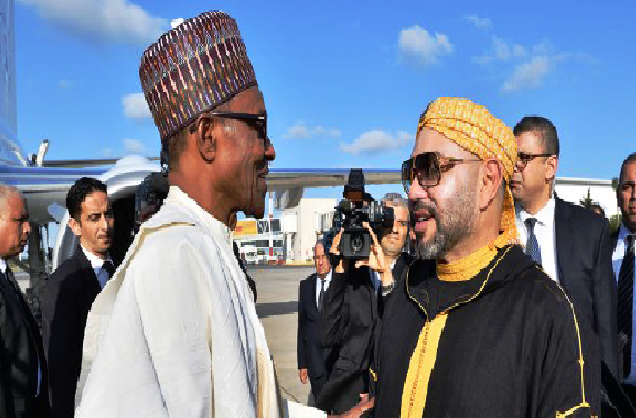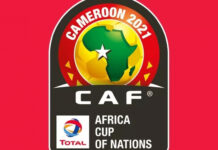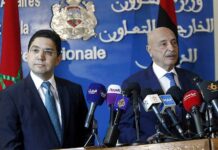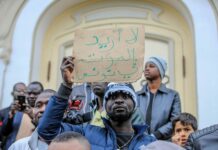In 2017, Morocco, Tunisia and Mauritania respectively applied for membership of ECOWAS (Economic Community of West African States), with observer and associate member status. Four years later, the situation remains unclear. Explanations:
“Morocco is in no hurry,” officials usually say. But four years after the application for membership formulated by the kingdom to the Economic Community of West African States [ECOWAS], still no response in the horizon.
As for the impact study initiated by the group of five Member States responsible for the dossier at ECOWAS, nothing new either, as Morocco’s request had gone unheeded.
Contacted by Jeune Afrique, neither the Moroccan Ministry of Foreign Affairs, nor those responsible for communication within ECOWAS wished to comment on the changes in this request made on February 24, 2017.
Confusing Situation
“There is a real omerta, no information is circulating on this project. Morocco was scalded by the negative reactions of certain stakeholders within ECOWAS. Nevertheless, bilateral discussions are still ongoing,” argues economist Larabi Jaïdi, Senior Fellow at the Policy Center for the New South and member of the Commission for the New Development Model.
In 2017, in the surge of Morocco, Tunisia and Mauritania respectively requested to obtain observer and associate member status within the West African institution.
Tunisia has been recognized, “but we don’t know what this observer status entitles. Is it just about attending ECOWAS meetings?” asks Larabi Jaïdi.
As for Mauritania, it increased the number of trips back and forth. Member of ECOWAS until 2000, it slammed the door to join the Arab Maghreb Union (AMU), a stillborn project mainly because of differences on the “Sahara issue”.
In the spring of 2017, Nouakchott signed an agreement with ECOWAS on the free movement of goods and people between the country and the 15 member states of the community, with a return to the West African free trade area scheduled for January 2019.
But ultimately, “Mauritania was asked to review its copy and to formulate a new application for admission,” explains Larabi Jaïdi.
Flurry of Moroccan Products.
In 2017, the day after Morocco’s application for membership, ECOWAS gave its “agreement in principle” before discreetly freezing the process.
In West Africa, this demand has aroused political reluctance, questions about the kingdom’s hegemonic aims vis-à-vis the continent and identity or cultural debates.
Above all, it stirred up an outcry in the West African private sector, with employers’ organizations and unions fearing strong competition from Morocco, or even being drowned in a flood of Moroccan products.
This was particularly the case in Senegal, Ghana and especially Nigeria – heavyweight of ECOWAS and main beneficiary of the West African free trade zone – which controls 40% of regional trade.
“However, in the space of ten years, Morocco has risen to the rank of fifth continental economic power and the leading African investor in West Africa”, underlined Yousra Abourabi, professor of political science at Rabat International University, in a column published in Jeune Afrique in 2019.
Nigeria Initially Reluctant
Having the most to lose, Nigerias was shown to be particularly reserved about Morocco’s membership and more generally about any opening up of ECOWAS to another country to the point of not signing the AFCFTA (African Continental Free Trade Area) agreement. ) of March 2018, which makes the continent a single market with the gradual elimination of customs duties on 90% of goods from member states.
In the meantime, the water has flowed under the bridges, and pragmatism seems to have won out over ideology.
Nigeria (traditionally pro-Polisario), like other sub-Saharan countries, has qualified its position on the conflict in the Sahara and preferred to focus on its major development projects with Morocco, a stable and efficient country, including the Morocco-gas pipeline, which Nigeria considers as the “Pan-African project of the century”, which will require twenty-five years of work at a cost of 25 billion dollars.
Before making a second turnaround in the summer of 2019 by ratifying the Zlecaf treaty.
Therefore, “this decision completely changes the terms of the negotiations between Morocco and ECOWAS: there is no longer any question of discussing the benefits or the risks linked to its membership in the West African free trade zone since that -It is, in fact, brought to be widened to the continent and that the negotiations on the particular points will be done within the framework of the AFCFTA ”, specifies Yousra Abourabi.
Additional Savings
“The integration of Morocco into ECOWAS, the development of AFCFTA, all of these represent much more complex processes than simple trade liberalization,” warns Larabi Jaïdi. For the moment, 35 African States out of 55 have ratified the AFCFTA, which must further strengthen its institutional identity, involve civil society and economic actors, and lay the technical foundations to ensure the proper functioning of this zone: the customs union or even “made in Africa”… More generally, AFCFTA must create a diversified and complementary continental economy between countries, and promote co-development. This is the sine qua non for developing intra-African trade and establishing an exportable offer “. So many structural changes that risk taking decades.
In 2017, according to the United Nations Conference on Trade and Development (UNCTAD), “intra-African exports represented 16.6% of total exports, against 68.1% for intra-European exports, 59.4% % for intra-Asians and 55% for intra-Americans ”.
These challenges directly concern Morocco. Against all expectations, despite offensive diplomacy and dozens of agreements signed with several African countries, the kingdom remains weakly integrated into the continent.
Priority to African Integration
According to the Moroccan Economic, Social and Environmental Council (CESE), the share of the kingdom’s trade with the rest of Africa does not exceed 4%.
Among the brakes to this continental integration: the absence of a formalized approach and economic diplomacy, a restricted target area (trade is concentrated in West Africa to the detriment of East Africa), a not sufficiently diversified, but also a weak integration of the regional economic communities to which Morocco belongs: the Arab Maghreb Union and the Community of Sahel-Saharan States (Cen-Sad).
“The recent breakdown in diplomatic relations between Algeria and the kingdom will exacerbate this breakdown. The potential of the regional value chain (gas, phosphate, automobile, etc.) will not be exploited to create a Maghreb industrial fabric, capable then of integrating into the continent, “underlines Larabi Jaïdi.
Ultimately, it is the snake that bites its tail: AFCFTA can accelerate Morocco’s accession process to ECOWAS, but to take advantage of this continental free trade zone, its economy must still be integrated on a regional scale.
In the meantime, together with Moroccan operators, we call for the presence of an African strategy in all Moroccan sectoral plans: industry, agriculture, tourism and the repositioning of absolute value chains in West African countries, especially for automobiles (tyres, aluminum) and textiles (cotton).
Recommendations shared by the EESC, which has made African integration a priority.
Adapted from Jeune Afrique September 15, 2021 at 10:54 am
By Nina Kozlowski











